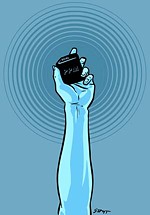FCC Overruled on 'Wardrobe Malfunction' Fine
By Kevin Brass, Fri., July 25, 2008

Invoking something resembling common sense, a federal appeals court Monday slapped down the Federal Communications Commission for imposing a $550,000 fine in the wake of Janet Jackson's boob pop during the halftime show of the 2004 Super Bowl. The 3rd U.S. Circuit Court of Appeals overruled the FCC's penalty, noting that the commission had "acted arbitrarily and capriciously" when it deviated, without warning, from its 30-year-old policy of ignoring the "fleeting" and unintentional incidents that occasionally pop up on television.
The FCC leaped into action after Justin Timberlake's shocking tug at Jackson's bustier, giving 90 million viewers with magnifying lenses a split-second glimpse of Jackson's nipple. The ensuing hysteria added the terms "Nipplegate" and "wardrobe malfunction" to the lexicon and became a symbol of the influence of the religious right in the Bush administration.
The FCC reportedly received more than 500,000 complaints about the incident, the vast majority of which, it turned out, were generated by self-appointed "watchdog" groups like the Parents Television Council. Nevertheless, the FCC tried to make an example of CBS for its moral degeneration in broadcasting Jackson's breast, even though the network denied prior knowledge of Jackson and Timberlake's dastardly scheme.
Noting that the incident centered on a "nine-sixteenths of one second glimpse of a bare female breast," the Court of Appeals ruled that the FCC can "change its policies" without judicial second-guessing, but "it cannot change a well-established course of action without supplying notice of and a reasoned explanation for its policy departure."
In a statement, CBS said it hoped the decision "will lead the FCC to return to the policy of restrained indecency enforcement it followed for decades." But the FCC appears undeterred. FCC Chairman Kevin Martin said he was "surprised" by the decision and "disappointed for families and parents." A similar case is headed for the Supreme Court later this year, where the new Republican-appointed majority will have a chance to make its own statement about the government's role in regulating TV morality.
Got something to say on the subject? Send a letter to the editor.








